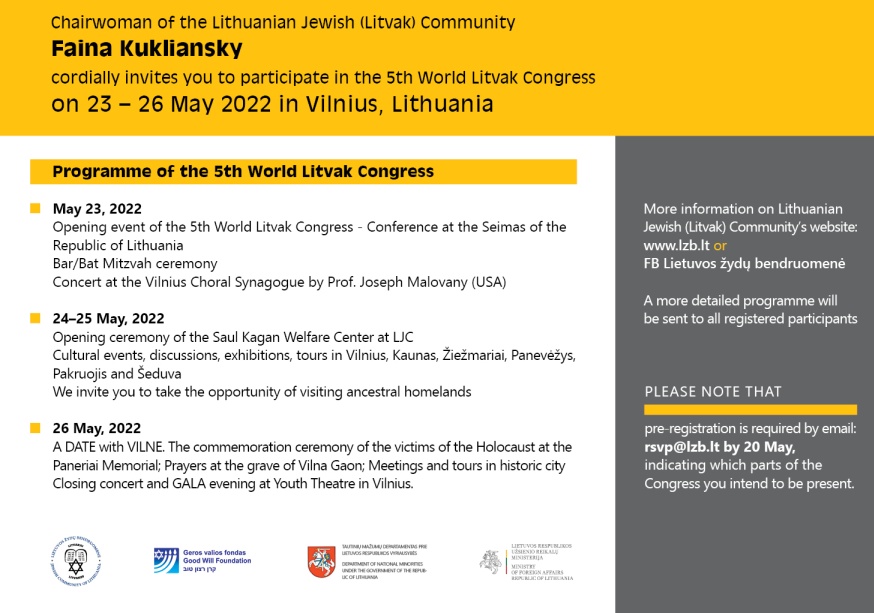The annual international Limmud conference will be held August 19 and 20 in the woods of south Estonia. To register, go to the Limmud page here. For more information, check out Limmud’s facebook page here.


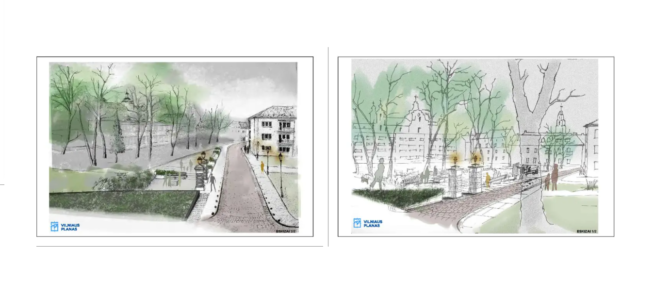
MadeinVilnius.lt
The city of Vilnius wants to reconstruct historical Žydų or Jewish street and decorate the territory of the former Great Synagogue with architectural accents recalling the 16th century. The Vilnius municipality and the Vilniaus Planas group of architects back in May presented the public proposed projects for the restoration of Žydų street and the Shulhoyf. The Vilnius city municipality approved a project this week.
The contours of historical Jewish street were established more precisely according to the location of fragments of street paving boards discovered. The current street trajectory has changed from the historical one and the proposal is to return it to its original course through the deconstruction and removal of existing street and sidewalk pavement. The paving stones on Stiklių street, which becomes Žydų street, would continue on into Žydų street, according to the current plan.
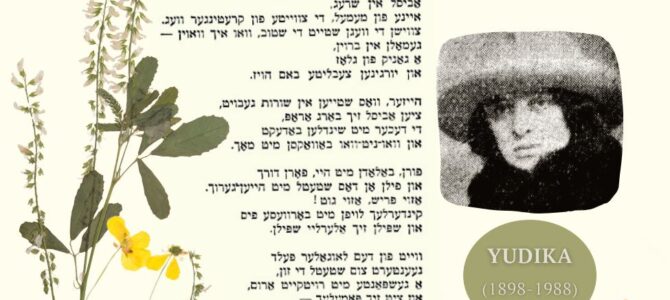
The Yiddish poetess Judith Tsik, also known as Yehudis and Yudis and the pen-name Judika, was born July 7, 1898, in Gargždai, Lithuania.
Encyclopaedia Judaica:
YUDIKA
YUDIKA (Yudis (Judith ) Tsik; 1898–1988), poetess. She was born in Gorzhd (Gargždai), Lithuania. Poverty forced her family to send Tsik to live with an aunt in Eastern Prussia, then annexed to Germany.
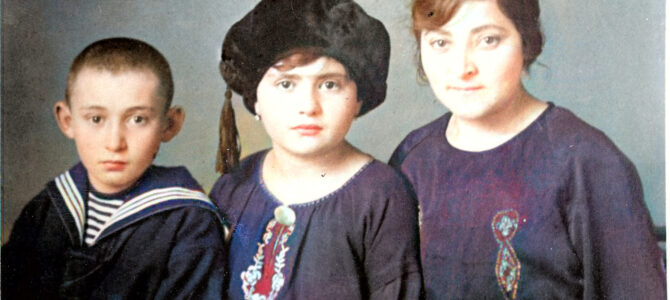
by Grant Gochin
When your grandmother’s last words make it clear that she’s not who you thought she was, you are willing to move all the mountains in Europe to get to the truth
Dinner between cousins was scheduled for Shabbat on Friday, May 14, 1915. How was I to know that the Shabbos meal never took place? Without warning, Russian forces launched a genocidal mass deportation of Baltic Jews deep into Russia. Families were torn apart, lives were destroyed and communities of Jews devastated.
The first inkling I had was on my grandmother’s deathbed. Her final lucid words to me were: “I wish I knew my name. I wish I knew who my family was.” We thought we knew her name–Bertha Lee Arenson. We were wrong.
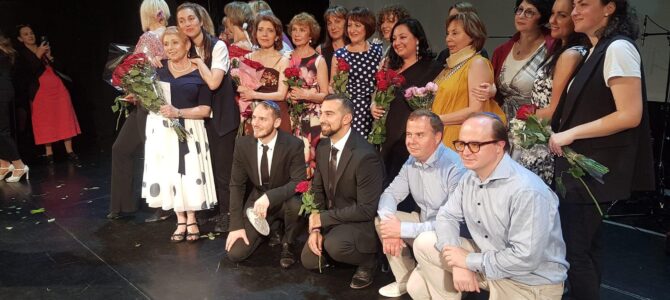
The Jewish song and dance ensemble Fayerlakh celebrated their 50th birthday on Sunday, June 19, at the Polish House of Culture in Vilnius with performances by musicians, singers and dancers.
The group formed back in the early 70s within the general milieu of Jewish, Lithuanian, Russian and Polish volunteer collectives, including the Yiddish-language People’s Theater. Many of the Jewish volunteer cultural groups–a choir, vocalists, a dance troupe, actors and personnel from the People’s Theater and a popular stage band–later immigrated to Israel and formed the Anakhnu Kan ensemble there. 1971 was also the year Jewish musician Yasha Magid founded a vocal and instrumental group. By 1972 this group had formed its core of enthusiastic musicians and the dance troupe, and held their first concert. That’s the story of how Fayerlakh, at the time the only Jewish song and dance ensemble throughout the Soviet Union, formed in Vilnius.
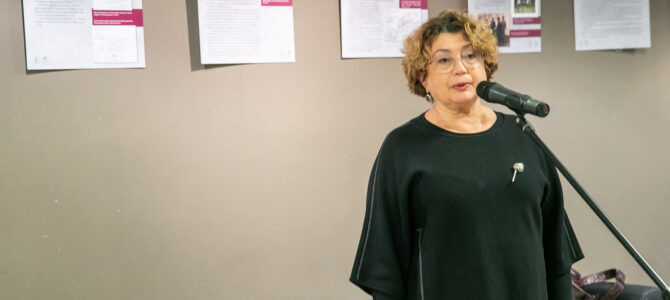
Lithuanian Jewish Community chairwoman Faina Kukliansky participated in a commemoration at the Lithuanian parliament to mark the Day of Mourning and Hope and the Day of Occupation and Genocide, and also attended a ceremony at a memorial in Naujoji Vilnia.
“Lithuanian Jews didn’t just experience the tragedy of the Holocaust, but also the repressions of the Soviet regime. The system sought to do away with the Jewish national spirit and the values. All sorts of means were used to achieve this, including the deportations already mentioned, but also communal and personal property seizures, the monument at Ponar blown up because it bore an inscription in Yiddish, synagogues nationalized and the closure of the YIVO institute. The Sovietization of the educational system dealt a huge blow to Jews, with private and communal schools banned. Some of the Jewish schools were destroyed, others were made into state schools where Hebrew was no longer taught and the traditional ethnic curricula–Jewish curricula–formed over many years were abolished. In their place new subjects were introduced, including mandatory Russian language and classes on the constitution of the USSR. The goal was obvious: to erase and replace the identity of the Jewish people. So when we talk about these horrific days in June, we are talking about a tragedy for Lithuanian citizens, no matter what their ethnic identity,” chairwoman Kukliansky said.
June 14 to 18 are remembered in Lithuania as an especially brutal part of history which destroyed the lives of many people of Lithuania, including Lithuanians, Jews, Poles and Russians. There is a public misconception the deportations during those days in 1941 only affected ethnic Lithuanians. Actually more than 3,000 Jews from Lithuania were among the deportees. The Lithuanian Jewish Community marks this painful anniversary annually in common with all the people of Lithuania and we will not forget the pain inflicted on Lithuania during this period in 1941.

Back in the time of King David, 3,000 years ago, the king was considered the best singer, and under his reign the professional musicians dynasty of the Levites from the tribe of Levi began. Music schools were established for singers of hymns and players of instruments. Hymns and instrumental music accompanied rituals for the offering of sacrifices at the Temple in Jerusalem built by Solomon in 959 BCE. During sacred rituals the priests blew 120 trumpets at the same time.
Of course we won’t go that deep into history. We’ll just discuss the period of Jewish music from Smetona’s Lithuania till today, discussion club #ŽydiškiPašnekesiai initiator Arkadijus Vinokuras promises.
The next discussion is called “Jewish Music: What Is It, and Why Doesn’t It Ever Grow Old?” on June 14, 2022.
The club will meet outside this time at the site of the former statue to Petras Cvirka where the Cvi in the Park Israeli street food kiosk is operating for the summer. The meeting will take place inside the Bagel Shop Café due to rain at 5:00 P.M. It’s open to everyone and will be live-streamed on the LJC facebook page.
Participants are to include Leonidas Melnikas, Boris Traub, Boris Kizner and Masha Dushkina, moderated by Arkadijus Vinokuras. The discussion will likely take place in Lithuanian.
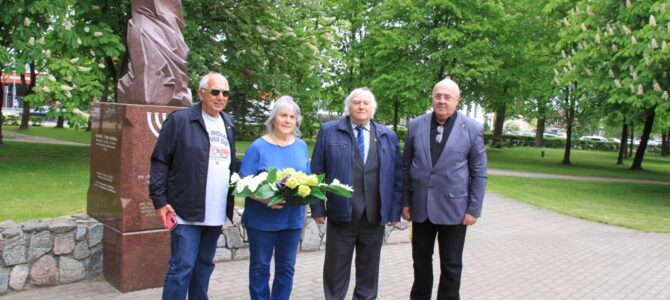
A delegation of participants from the Fifth World Litvak Congress travelled to Panevėžys May 25 and were met there by members of the Panevėžys Jewish Community and the local municipality.
Panevėžys city municipality deputy director of administration Žibutė Gaivenienė said: “It is nice to welcome today guests arriving in Panevėžys from the Fifth World Litvak Congress and members of the city’s Jewish community. Panevėžys has long been a multi-ethnic and multicultural city, and the Jewish community has played an important role in the life of the city and the whole district. At certain periods of history Jews constituted a very significant part of the population of the city and were active participants in the city’s economic and service sectors. A larger Jewish community formed in the city in the second half of the 18th century. In the mid-19th century Jews constituted about 60 percent of the city population, and in the early 1920s Jews accounted for about 35 percent of the population. So the Jewish community’s contribution to the development of Panevėžys, and especially its transformation into a modern city, is a great one, and the Jewish legacy in different forms still operates in our daily life.”
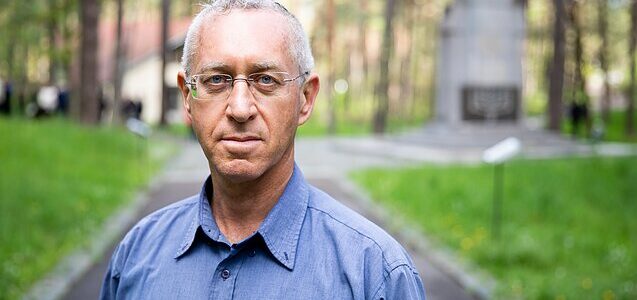
Lithuanian State Television and Radio LRT.lt interview with Ben Tsiyon Klibansky
Lithuanians are still heroizing people who took part in the Holocaust, regrets historian and author Ben Tsiyon Klibansky. It’s up to the nation’s leaders to start a long-overdue conversation about these painful pages from the country’s history.
Ben Tsiyon Klibansky teaches at Tel Aviv University and researches Eastern European Jewry. This is now a lost world, and the Jews of Lithuania were the cornerstone in this world, Klibansky tells LRT.lt, something he feels it to be his duty to research.
You were born in Lithuania, Vilnius, but now, you live in Israel. Could you tell me more about your connection to Lithuania?
My family was a traditional family. My grandfather was a spiritual leader of the community. … I was a student at the Antanas Vienuolis School for two years, then my parents got permission to leave Lithuania and immigrate to Israel, which had been their dream for many years.
You should understand that it wasn’t because they hated Lithuania, but because of the prophecies of the prophets Isaiah and Ezekiel, who promised one day we will return to the land of Israel and settle there again. They tried to get permission to leave Lithuania and go to Israel, but it was Soviet Lithuania and the Soviets didn’t let them to go. It took them 13 years, from 1956 when they returned from Siberia until 1969. …
After I finished high school in Israel I started studying at Tel Aviv University. I studied electronic engineering. I joined the army and served for many years. I was a high-ranking officer in the army and when I finished my army service, I got a very good contract in the industry.
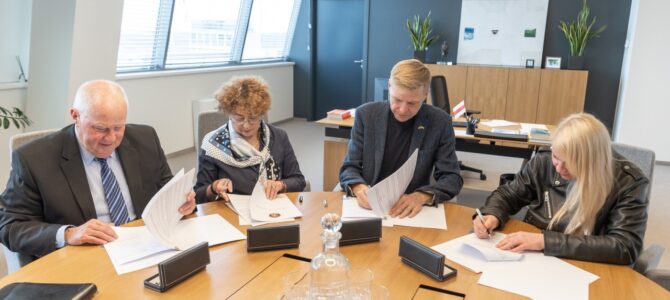
The Vilnius city municipality, the Goodwill Foundation and the Lithuanian Jewish Community have signed a memorandum for commemorating the Vilnius Great Synagogue site by mid-2026. The synagogue site and surrounding area which was home to the synagogue complex will become a Vilnius Great Synagogue memorial square with a Lithuanian Jewish Community information center telling the story of the grand synagogue complex to the wider society.
“Many Vilnius residents know why Vilnius is called the Jerusalem of the North. Faded inscriptions in Hebrew, commemorative plaques and monuments on and around buildings in the former Vilnius ghetto recall the history of Jewish spirituality and learning. We have agreed how we will create a new center of attraction for Lithuanians and foreigners at the site of the Great Synagogue destroyed by the Soviets,” Vilnius mayor Remigijus Šimašius said.
Archaeological investigations of the Great Synagogue site began circa 2010. Archaeologists at the digs discovered part of the bimah, the foundations for two of its columns, the two mikvot ritual bath sites, the location of the large external wall at the back of the synagogue and a portion of the original flooring in the main chamber of worship. They also discovered inscriptions engraved on the walls next to where the bimah stood, naming people and quoting from the Book of Genesis and lines from hymns.
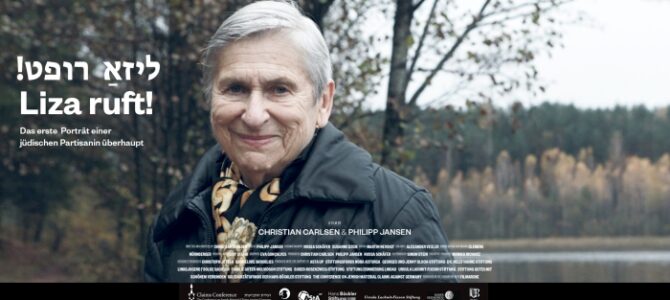
In 2014 a group of German filmmakers travelled to Lithuania to document the amazing life story of our resident Jewish partisan soldier and long-standing member of the Community who recently celebrated a milestone birthday. The film was released in 2015 and is available on DVD and may be booked by cinemas anywhere in the world (see contact information at the bottom of this post). Here are the liner notes from the DVD released in 2015:
Fania Yocheles-Barntsovskaya was about to begin her studies when on June 22, 1941, the Germans invaded her hometown of Vilnius, known at that time as the Jerusalem of the North.
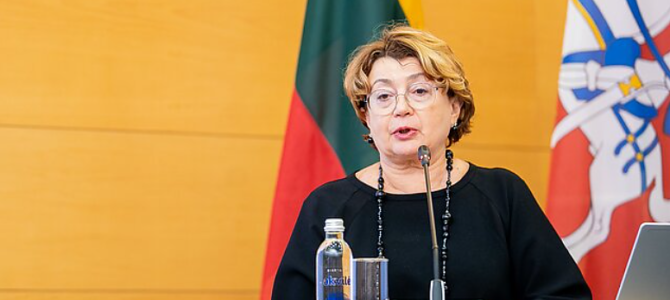
15min.lt, BNS
The Fifth World Litvak Congress kicked off at the Lithuanian parliament Monday.
Lithuanian Jewish Community chairwoman Faina Kukliansky said this congress sends the message that Jewishness isn’t just a thing of the past in Lithuania.
“Today we invite you to an open discussion on the future of Litvak culture and the importance of passing this culture on to our children and grandchildren,” she said. “I am certain the Lithuanian state has an interest in making all Litvaks from around the world feel at home in their native land.”
Parliamentary speaker Viktorija Čmilytė-Nielsen used the opportunity to talk about the Ukraine.
Besides the academic conference Monday, an exhibit called “Almanach of Litvak Culture in the 21st Century” was also opened. Topics at the conference included fighting anti-Semitism, Litvak history and education, among others.

We wish a very happy milestone birthday next week to Vilnius ghetto survivor and Jewish partisan Fania Brantsovskaya.
You were about to begin university when the Germans invaded on June 22, 1941. When they ordered your family into the Vilnius ghetto, you crossed the street, Pylimo, to the Jewish Hospital section of the ghetto between Pylimo and Ligoninės streets. You joined the FPO, carried out sabotage missions against the Lithuanian Nazis, fought in the forests and marched into Vilnius with the Red Army when the Soviets liberated the Lithuanian capital. Although the fascists murdered your entire family, you stayed in the country and continued fight for a better future. After your husband passed away, you devoted yourself to telling the truth to the younger generations about the Holocaust and how Jews didn’t go like lambs to the slaughter, but fought tooth and nail, and prevailed against their oppressors.
We salute your bravery, your decision to fight and the life you devoted to telling the truth and serving humanity in your native land.
Mazl tov. Bis 120!
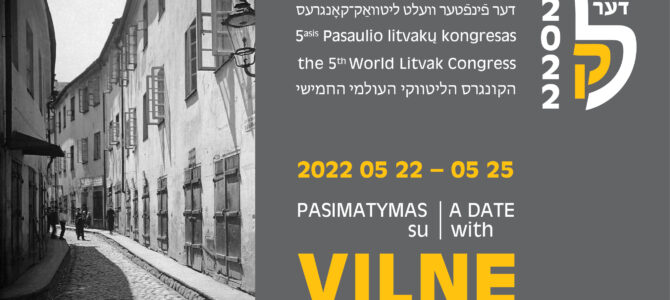
The Fifth World Litvak Congress will be held on May 23-26, organized by the Lithuanian Jewish Community. We invite you to join the events and enjoy Litvak culture, heritage, history and music. Share the news with your relatives, friends and colleagues.
Pre-registration is required by filling out the following form:
https://forms.gle/VJa9nMHaHjH4t5Lf6
The program may be found here:
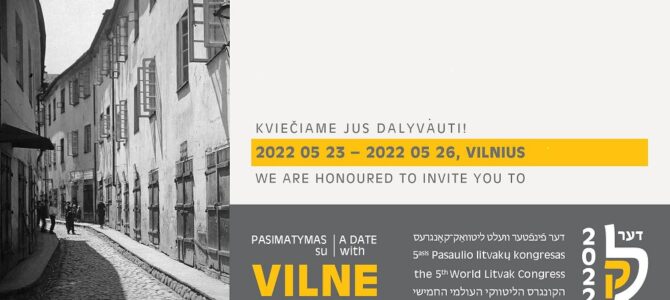
The following is the program of events for the Fifth World Litvak Congress to be held in Vilnius from May 23 to May 26, 2022.
A PDF file of the program can be downloaded here.
§§§
Events Program for the Fifth World Litvak Congress in Vilnius
May 23
Opening ceremony for the Fifth World Litvak Congress
The Lithuanian Jewish Community invites Litvaks living around the world to return to Vilnius May 23 to May 26, to visit the land of our ancestors and to attend the Fifth World Litvak Congress.
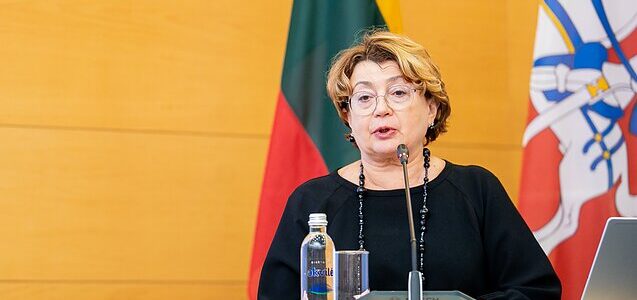
The Lithuanian Jewish Community is inviting Litvaks from around the world to come to Vilnius from May 23 to May 26, to visit the land of their ancestors and to take part in the Fifth World Litvak Congress. The four-day congress has a program which includes discussions, tours of historical sites and different cultural activities dedicated to Jewish heritage in Lithuania and achievements by Litvaks on the world stage.
Events include the opening at the Lithuanian parliament and a concert by American cantor and professor Joseph Malovany at the Choral Synagogue in Vilnius in an evening of concerts called “A Date with Vilne” which will include Lithuanian musicians and actors paying homage to the memory of the Jews who lived and worked in Lithuania.
Lithuanian parliamentary speaker Viktorija Čmilytė-Nielsen is the official patron of the Fifth World Litvak Congress. She said: “This Litvak Congress is happening while aggression is running wild in the Ukraine, when war fever has infected the entire region, which is significant to Lithuania historically and today, and to the entire world of Yiddish culture. In the face of blind brutality and violence it is always important to emphasize humanitarianism, empathy, the highest spiritual values from which the long Litvak tradition has always taken strength. This is especially urgent today when in the east of Europe an aggressive and imperialistic anti-Semitism has again raised its head, distorting historical facts and manipulating peoples’ emotions. We must oppose this.”
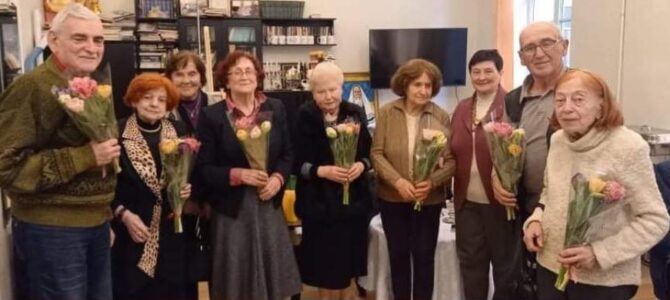
The club for senior citizens was set up by Lithuanian Jewish Community chairman Simonas Alperavičius and deputy chairwoman Maša Grodnikienė on April 26, 1998, and was later named Abi Men Zet Zich, Yiddish for “just to see you again.” The name was the idea of the late Milan Cheronski. We wish club coordinator and social services director Žana Skudovičienė and all our seniors a very happy anniversary.
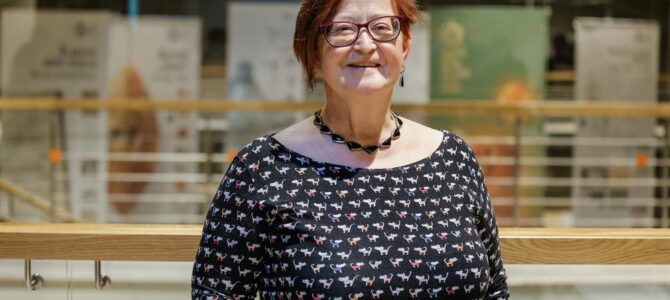
Ruth Leiserowitz, an historian from Germany, has researched the dramatic forced migration out of Klaipėda, also known as Memel, before World War II. She will present her newest book on the subject called “Žydai Klaipėdoje (Mėmelyje)” [Jews in Klaipėda (Memel)] at the Ieva Simonaitytė Public Library in Klaipėda at 5:00 P.M. on April 29.
The publication is intended to coincide with the 770th birthday of the port city.
Leiserowitz’s father came from Memel and she worked at Klaipėda University after Lithuanian independence, and helped organize the Thomas Mann festival in Nida, Lithuania. She got interested in her research topic because of her Jewish father-in-law who was born in Šilutė, then known as Heydekrug. In 1923 his family left Memelland when it was annexed by Lithuania. She decided to look into the fate of Jewish families forced to leave the region. She says her research is often something like a detective novel.

Original article: obzor.lt, 2022-03-22
Translated from Russian to Lithuanian by Irena Miškinienė, and from Lithuanian to English by Geoff Vasil
My Teacher Joshua Levinson Would Have Turned 90 Today
by professor Pinchos Fridberg,
Vilnius
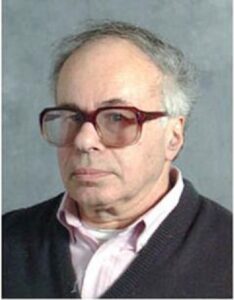
Joshua Levinson
In the place of an introduction
When you have reached the 80-year mark and have become an old and tired horse who can barely lift his hooves, and they take you funem yarid (Yiddish, “from the fair,” a formulation by the Yiddish writer Sholem Aleichem), the faces of your dearest and most beloved people appear before you ever more often, those who have left this world before you. My parents who gave me life. My Teachers who were sent by destiny.
* * *
